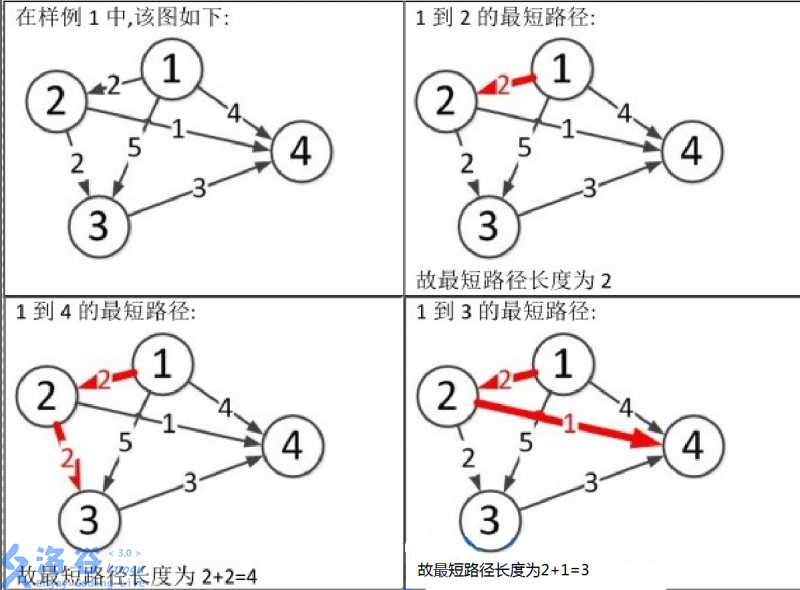题目背景
本题测试数据为随机数据,在考试中可能会出现构造数据让SPFA不通过,如有需要请移步 P4779。
题目描述
如题,给出一个有向图,请输出从某一点出发到所有点的最短路径长度。
输入输出格式
输入格式:
第一行包含三个整数N、M、S,分别表示点的个数、有向边的个数、出发点的编号。
接下来M行每行包含三个整数Fi、Gi、Wi,分别表示第i条有向边的出发点、目标点和长度。
输出格式:
一行,包含N个用空格分隔的整数,其中第i个整数表示从点S出发到点i的最短路径长度(若S=i则最短路径长度为0,若从点S无法到达点i,则最短路径长度为2147483647)
输入输出样例
输入样例#1: 复制
4 6 1
1 2 2
2 3 2
2 4 1
1 3 5
3 4 3
1 4 4输出样例#1: 复制
0 2 4 3说明
时空限制:1000ms,128M
数据规模:
对于20%的数据:N<=5,M<=15;
对于40%的数据:N<=100,M<=10000;
对于70%的数据:N<=1000,M<=100000;
对于100%的数据:N<=10000,M<=500000。保证数据随机。
对于真正 100% 的数据,请移步 P4779。请注意,该题与本题数据范围略有不同。
样例说明:

图片1到3和1到4的文字位置调换
看了正月点灯笼的视频 想看视频点传送 传送
让我了解了bfs最短路 和 对优先队列的深入了解(大根堆 小根堆);
关于优先队列可以参考我前面的博客;
思路:先用静态链表存图,然后用用结构体建立一个自己想要的优先队列;然后bfs存点;
此题是弱化版,所以数据有点水,用弱化版的代码过不了标准版Orz;
历经千辛万苦优化成功,下面的代码两道题都能过
#include <iostream>
#include <cstdio>
#include <cstring>
#include <queue>
#include <cctype>
#define maxn 500005
typedef long long ll;
using namespace std;
ll inf = 2147483647;
ll n,m,k,cnt;
ll head[maxn];
ll rec[maxn];
struct edge
{
ll b,c,next;
}
plan[maxn];
struct node
{
ll edg;
ll dis;
node(ll xx,ll yy):edg(xx),dis(yy){}
bool operator < (const node nod) const
{
return dis > nod.dis;
}
};
void bulid(ll a,ll b,ll c)
{
plan[++cnt].next = head[a];
plan[cnt].b = b;
plan[cnt].c = c;
head[a] = cnt;
}
void bfs(ll be)
{
bool flag[maxn] = {0};
priority_queue<node>q;
q.push(node(be,0));
while(!q.empty())
{
node mr = q.top();
q.pop();
flag[mr.edg] = 1;
rec[mr.edg] = min(rec[mr.edg],mr.dis);
if (mr.dis != rec[mr.edg]) continue;
for(int i = head[mr.edg]; i != 0; i = plan[i].next)
{
ll ww = plan[i].b;
if(flag[ww] == 0 && mr.dis+plan[i].c < rec[ww])
{
rec[ww] = mr.dis + plan[i].c;
q.push(node(ww,mr.dis+plan[i].c));
}
}
}
}
int main()
{
ios::sync_with_stdio(0);
cin.tie(0),cout.tie(0);
cin >> n >> m >> k;
for(int i = 1; i <= n; i ++)
{
rec[i] = inf;
}
for(int i = 1; i <= m; i ++)
{
ll x,y,z;
cin >> x >> y >> z;
bulid(x,y,z);
}
bfs(k);
for(int i = 1; i <= n; i ++)
{
cout << rec[i] << ' ';
}
cout << endl;
return 0;
}